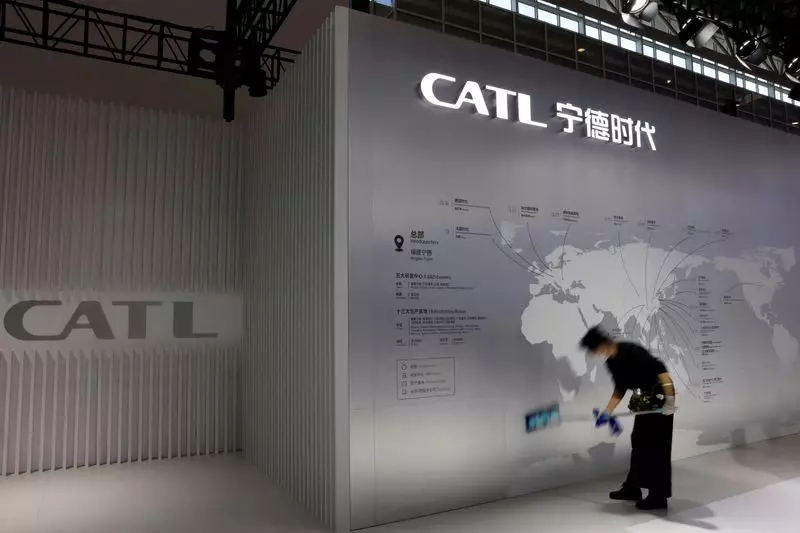On Monday, the U.S. Defense Department revealed a significant update to its list of Chinese companies associated with the military, a move that has sparked both a financial downturn for the implicated firms and widespread controversy. Notable additions to this annual “Section 1260H list” include Tencent Holdings, a prominent figure in gaming and social media, battery manufacturing titans such as CATL, alongside other technological enterprises like Changxin Memory Technologies and Quectel Wireless. The Pentagon’s decision highlights ongoing tensions between the U.S. and China, reflecting a growing apprehension regarding national security implications linked to Chinese tech firms.
As per the recently published document in the Federal Register, the Defense Department designated a total of 134 companies this year, indicating a shift in how the U.S. perceives the technological ecosystem tied to China’s military advancements. This latest designation not only reaffirms the U.S. stance on monitoring Chinese enterprises but also serves as a warning to American and global investors regarding the potential risks associated with dealings in the Chinese tech market.
The response from the market was swift following the announcement. Shares of Tencent saw a sharp decline, tumbling approximately 7% in early trading, while its U.S.-listed counterparts dropped by around 8%. CATL also experienced notable losses, with shares dropping over 5%. The financial implications of being listed can be substantial, not merely because of immediate stock price effects but because of the longer-term reputational damage that such designations might confer.
Companies like Quectel echoed the sentiment of their counterparts, highlighting that their inclusion in the list was erroneous and asserting that they do not have military affiliations. This concern over the implications of being identified as a military-associated company is central to their public relations strategies, as they seek to reassure stakeholders and clients about their business integrity and security compliance.
The Broader Political Context
The recent actions from the U.S. government are not isolated; they form part of an ongoing series of measures designed to curtail what the Pentagon perceives as increasingly threatening ties between American technology and Chinese military capabilities. The justification for these actions often hinges on accusations that certain corporations are not merely commercial entities but are instead pivotal in advancing China’s military modernization efforts.
The Defense Department stipulates that the list serves as a reference for other regulators within the U.S. government and underscores a robust policy shift towards heightened scrutiny of companies operating across borders. Experts have posited that this list reflects a broader national strategy to protect vital technologies from falling into hands that may leverage them for military purposes.
Industry analysts have voiced concerns regarding the potential fallout from these listings. Craig Singleton, a researcher specializing in China at the Foundation for Defense of Democracies, remarked on the expanding boundaries around sensitive technologies, suggesting that the recent designations articulate a much larger narrative regarding the intertwining of commerce and national security. He posited that the very existence of this list is a clear indication of increasing restrictions, urging American businesses to pause and reflect on the implications of maintaining partnerships with certain Chinese firms.
Furthermore, financial analysts have pointed out that while the Pentagon may not enforce immediate bans, the reputational risk and potential for future sanctions could deter investment and business collaborations. The U.S. Treasury may feel pressured to take further action depending on the evolving geopolitical landscape, particularly as tensions between the two superpowers continue to escalate.
This list is not merely a static roster; it had previously elicited legal challenges from entities such as drone manufacturer DJI and Lidar technology producer Hesai Technologies. These companies contested the Pentagon’s designation, displaying a willingness to fight against perceived inaccuracies in their classification. Their persistence highlights the contentious nature of administrative decisions regarding national security and the beliefs that companies hold about their standings within international commerce.
Meanwhile, the Pentagon’s removal of six companies previously ensconced on this list demonstrates a selective and perhaps changing approach to enforcement, implying that firms can successfully navigate these turbulent waters if they meet certain criteria over time. However, for companies like CATL and Tencent, the road to rectifying their images may be arduous, fraught with the challenges that arise when dealing with the complexities of international relations and defense policies.
The U.S. Defense Department’s updated list of Chinese companies linked to military activities represents a pivotal moment in the unfolding narrative of U.S.-China relations and the surveillance of cross-border technology firms. As both sides navigate this multifaceted reality, the implications for commerce, international collaboration, and national security will likely reverberate for years to come.

